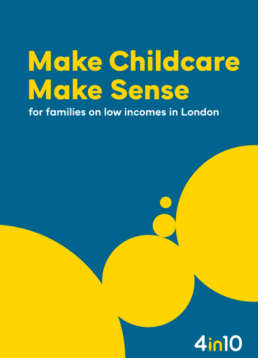
Early education and childcare has not been at the forefront of the last few elections but notably this time around it is a hot topic. All the main political parties seem to recognise, albeit from differing perspectives perhaps, that there is much to be gained from better supporting and investing in children in their earliest years. The Conservatives have re-emphasised their commitment to rolling out 30 hours of childcare a week to working parents with children from nine months old to when they start school by September 2025. The Labour Party have also pledged to deliver this same commitment and plan to open an additional 3,000 nurseries through upgrading space in primary schools to help them do so. The Liberal Democrats for their part say they would close the attainment gap by giving disadvantaged children aged 3 and 4 an extra five hours free a week and tripling the Early Years Pupil Premium to £1,000 a year.
The question we, as London’s Child Poverty Network are asking of all these offerings is whether they will benefit children and families experiencing poverty who at the moment are benefiting less from the system than their wealthier peers. Back in March we published a research report ‘Make Childcare Make Sense for families on low incomes in London’. In it we looked through the eyes of parents of young children living on low incomes in London and found that the current childcare system makes little sense to them. The funding entitlements were often not accessible as they couldn’t be used without having to pay ‘top ups’; they were not flexible enough to meet their individual circumstances; and were not inclusive for their children, those with special educational needs and disabilities and those whose families have no recourse to public funds being especially likely to be excluded. One single mum of a three-year-old told us:
‘You know, you’re kind of making lots and lots of sacrifices to afford what essentially is a basic need to help our economy keep moving. Yeah, [the childcare system] just shuts people out of work.’
Sadly, the Government’s expansion of funding entitlements which began to be rolled out shortly after our report was published in April this year, will do little to improve the situation for these families. Just 1 in 5 (or 20%) of families earning less than £20,000 a year will have access to the planned expansion of funded places for one- and two-year-olds in some working families, compared to 80% of those with household incomes over £45,000.[1] This matters to us because access to affordable, high-quality childcare and tackling child poverty are inextricably linked.
Sky high childcare costs in London are one driver of our high child poverty rate; including childcare costs in the Social Metric Commission’s measure of poverty increases the poverty rate among families with children by 0.4 percentage points.[2] So, at the most straightforward level, bringing down childcare costs, for those that already incur them, has the potential to reduce levels of child poverty. Beyond this, affordable and accessible childcare can contribute to poverty alleviation by supporting parents and carers to access paid work if they do not already or to increase their hours, and so increase their household income. Lastly but certainly not least, we know that high quality early education is critical to a child’s development and later educational achievement.[3]
For all these reasons, it is imperative that whoever forms the next Government deliver an early education and childcare system that benefits all children. We believe that the best way to make sure this happens is for childcare reform to be at the heart of a strategy to address child poverty. The Labour Party has made a very welcome commitment in its manifesto to putting in place a Child Poverty Strategy, it must make sure that its policy on childcare in a key plank of this. If it doesn’t and this synergy isn’t realised is a very real risk that childcare policy rather than reducing inequality, could increase it.
[1] Drayton, E. et al. (2023). Childcare reforms create a new branch of the welfare state – but also huge risks to the market. Institute for Fiscal Studies. Available at: https://ifs.org.uk/ news/childcare-reforms-createnew-branch-welfare-state-alsohuge-risks-market
[2] Poverty Strategy Commission (September 2023) Interim Report: A new strategy for tackling poverty
[3] Melhuish, E. and Gardiner, J. (2023). Equal hours? Sutton Trust

